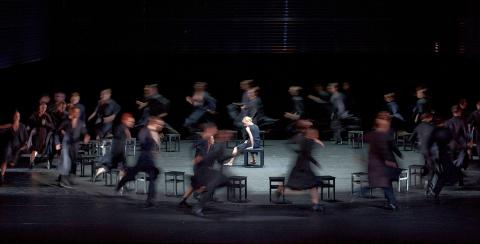The National Kaohsiung Center for the Arts (Weiwuying) opens its portion of the 11th Taiwan International Festival of Arts (TIFA) this weekend with two performances by the Ballett am Rhein Dusseldorf Duisburg, with artistic director Martin Schlapfer’s 7.
The troupe is making its Taiwan debut with the Kaohsiung shows, might be a first-time visitor to the nation, but it is very familiar with Weiwuying’s artistic director, Chien Wen-pin (簡文彬), who moved to Dusseldorf, Germany, in 1996 to become a conductor at the Deutsche Oper am Rhein, which is also home to the ballet company.
Tanz, Europe’s premier dance magazine, named Schlapfer its “Choreographer of the Year” in 2010, just a year after he took over the revived Ballett am Rhein, and has named the troupe “Company of the Year” four times, from 2013 to 2017.

Photo courtesy of the National Kaohsiung Center for the Arts
The company’s appearances in Taiwan will be special because it will be accompanied by the Taipei Symphony Orchestra (台北市立交響樂團), which will be conducted by Chien.
Ballet performances in Taiwan that feature live music are a rarity: Taiwanese choreographer Allen Yu (余能盛) made a point to have an orchestra for his productions for the Chamber Ballet Taipei — later the Formosa Ballet (福爾摩沙芭蕾舞團). Visiting troupes such as the Kirov Ballet sometimes bring their own, but otherwise dancers usually perform to recordings.
Chien began working with Schlapfer and the ballet company in 2012 and the two men collaborated from the beginning on 7, which premiered in October 2013 and is set to Gustav Mahler’s Symphony No. 7.
In an interview posted on Weiwuying’s Web site, Chien said he is eager for Taiwanese audiences to see how Schlapfer connects Mahler’s piece with modern social issues.
Chien ranks the Swiss-born Schlapfer as one the of two choreographers he knows who have the best ears for music; the other is Cloud Gate Dance Theatre (雲門舞集) artistic director Lin Hwai-min (林懷民).
“When they hear music, they can instantly grasp the context and development of the melody, and even predict the next note,” he said.
Mahler’s works are popular among conductors because they “have a clear sense of what the conductor should do,” he said.
Symphony No. 7 is not as well-known as Mahler’s other works, and has been sometimes called his “problem child,” with its awkward first movement, but Schlapfer used that difficult opening to create a whirlwind of activity, filled with dancers in dark costumes and a variety of footwear (or none), before segueing into calmer waters and combinations of pairs and groups, a romantic pas de deux and pointe work.
He has been quoted as saying that “the more I listen to the ‘7,’ the crazier it gets. Mahler’s music releases things in my own choreography which I did not believe I had in me.”
The ballet runs 80 minutes, with no intermission. Following his weekend’s shows in Kaohsiung, the company and orchestra will give two performances at the Grand Theater in the National Taichung Theater to open its TIFA program.

Towering high above Taiwan’s capital city at 508 meters, Taipei 101 dominates the skyline. The earthquake-proof skyscraper of steel and glass has captured the imagination of professional rock climber Alex Honnold for more than a decade. Tomorrow morning, he will climb it in his signature free solo style — without ropes or protective equipment. And Netflix will broadcast it — live. The event’s announcement has drawn both excitement and trepidation, as well as some concerns over the ethical implications of attempting such a high-risk endeavor on live broadcast. Many have questioned Honnold’s desire to continues his free-solo climbs now that he’s a

As Taiwan’s second most populous city, Taichung looms large in the electoral map. Taiwanese political commentators describe it — along with neighboring Changhua County — as Taiwan’s “swing states” (搖擺州), which is a curious direct borrowing from American election terminology. In the early post-Martial Law era, Taichung was referred to as a “desert of democracy” because while the Democratic Progressive Party (DPP) was winning elections in the north and south, Taichung remained staunchly loyal to the Chinese Nationalist Party (KMT). That changed over time, but in both Changhua and Taichung, the DPP still suffers from a “one-term curse,” with the

Jan. 26 to Feb. 1 Nearly 90 years after it was last recorded, the Basay language was taught in a classroom for the first time in September last year. Over the following three months, students learned its sounds along with the customs and folktales of the Ketagalan people, who once spoke it across northern Taiwan. Although each Ketagalan settlement had its own language, Basay functioned as a common trade language. By the late 19th century, it had largely fallen out of daily use as speakers shifted to Hoklo (commonly known as Taiwanese), surviving only in fragments remembered by the elderly. In

Lines between cop and criminal get murky in Joe Carnahan’s The Rip, a crime thriller set across one foggy Miami night, starring Matt Damon and Ben Affleck. Damon and Affleck, of course, are so closely associated with Boston — most recently they produced the 2024 heist movie The Instigators there — that a detour to South Florida puts them, a little awkwardly, in an entirely different movie landscape. This is Miami Vice territory or Elmore Leonard Land, not Southie or The Town. In The Rip, they play Miami narcotics officers who come upon a cartel stash house that Lt. Dane Dumars (Damon)